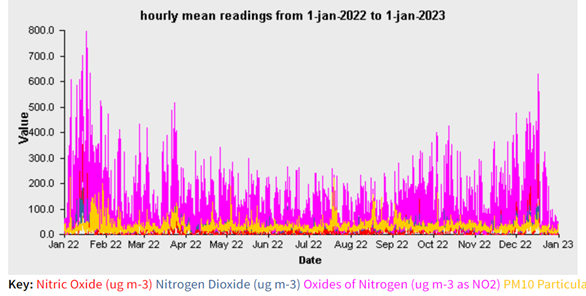Kingston’s air pollution has been rising rapidly since the beginning of the year and last month hit level 10 – the highest level there is on the government’s air pollution index.
The rapid rise is a worrying trend that puts everyone in the borough at risk. While efforts are being made to improve Kingston’s air quality, many residents say that these are simply not enough.
Kingston’s current AQI (air quality index) rating is 3.5 times the level set by the World Health Organisation (WHO).
The main pollutant in Kingston’s air is a pollutant known as PM 2.5, this pollutant is ‘fine particle matter’ and is noted by the WHO and leading scientists as a concern for people’s health. When PM 2.5 are very high the air can appear hazy.

The concerns associated with high levels of PM 2.5 come from the fact that the particles can get deep into the lungs and even the bloodstream. Exposure can lead to lung and heart problems as well as severe breathing difficulties.
Another pollutant found in Kingston’s air is nitrogen dioxide and Kingston’s air has one of the highest concentrations of nitrogen dioxide in the capital.
Dr Jon Walsh who works with The London Air Quality Network (LAQN) said: “The air pollution in London right now is very concerning. In 2020 we first saw air pollution listed on the death certificate of a nine year-old child and it is estimated that air pollution is responsible for the deaths of around 9500 Londoners per year.
“This is why we must act fast on tackling this problem.”
The causes of Kingston’s air pollution problems are many. Like many places in London, Kingston has heavy traffic, congestion and high-rise buildings that reduce air circulation.
Kingston is also home to major construction projects which can also increase air pollution.
Kingston students Dalia Kenerson and Alex Svieserly said the pollution is a real concern for them.
Svieserly said: “I have asthma and I have noticed that since moving to London, I’ve had to use my inhaler a lot more and have experienced chest pains at times.
“I’d like to be able to be outdoors more, but as it stands with the current air pollution levels, I know that’s not advisable.”
Kenerson said “Air pollution is terrifying. We’ve got levels of pollutants that are a major concern and I’m worried that not enough is being done.
“Even since the ULEZ introduction in central London, it feels like the problem is getting worse.”
Tackling the problem
Although we are all vulnerable to the impact of air pollution, some people are particularly vulnerable.
According to the LAQN children, the elderly and those who have pre-existing respiratory difficulties are at high risk of serious consequences due to air
pollution.
During times of high air pollution, those who are more vulnerable to the impact of air pollution are advised to limit outdoor exercise, avoid busy roads
and change their exercise routine to avoid heavy breathing.
Dr Walsh said: “Air pollution is more common in towns and cities because it builds up due to busier roads and often becomes trapped due to the high
amount of high-rise buildings. It’s worse during still or rainy weather.
“There are many ways to help decrease the pollution in the air, using more public transport or electric vehicles is a good idea and less polluting methods of transport, like cycling or walking.
“For the government, limiting construction projects and investing in green energy is necessary.”
Those concerned can find daily levels of air pollution on the LAQN website as well as other resources online. Air pollution sensors for the home are available and DEFRA’s independent Air Quality Expert Group (AQEG) has guidance those available on their website.
Kingston also has its own Citizens Assembly on Air Quality which works with the Council to improve the quality of air in the borough details of which can be found on the Council website.

